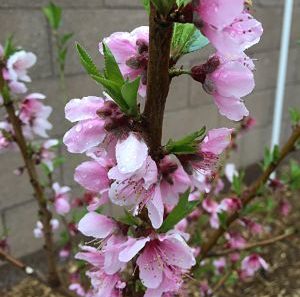Love Languages of Gardening
by Guest blogger: Katie Fiore
Listen to her podcast HERE

Love Languages of Gardening
When you love to garden, it’s not always easy to explain why you love it. Often, we make a joke about how we like to play in the dirt. And that’s a legit reason! There’s scientific proof that playing in the dirt exposes you to soil microbes that stimulate your body to produce serotonin. Other times, we excitedly start talking about the last harvest from our backyard. But WHY do certain people love to garden while others don’t? In my opinion, it’s because of how it speaks to our love languages.
I mentioned in my podcast that the book that I love and reference the most is The 5 Love Languages by Gary Chapman. This book has helped me understand my needs and interactions in my relationships, hobbies, and work. By simply understanding how we like to give and receive caring, it helps to identify what makes us feel fulfilled.
So how does gardening satisfy our love languages? Let’s break it down into each of the Love Languages – as applied to gardening!
Physical Touch
This is probably the easiest of the gardening love languages! Many humans crave physical touch. In relationships, this comes through as hugs, holding hands, and massage. In gardening, it is the feel of the soil in your hands. The texture of fruit as you test to see if it’s ready to pick. It’s feeling the leaves and bark as you prune a plant. We all know how tactile gardening can be, and while we don’t < always > go hug our trees, the physicality fulfills our need for physical touch.
Quality Time
Quality time in the relationship world is usually characterized by activities together and conversation. In gardening, the quality time you get is with yourself! This activity does take focus at times but throughout much of the act of gardening your mind is free to have a conversation with itself.
Have you ever gone outside to work with your plants when you have a lot on your mind? For me, it gives me times to let my mind circle and wander through whatever thoughts it needs to address. Even with the heaviest topics, they don’t seem quite as bad if I’m mulling through them with the sun on my face and a plant in my hand!
Sometimes we are lucky enough to have a gardening buddy. This is a great activity to encourage conversation and bonding! Have you ever gotten to spend quality time gardening with a kid? The teaching and interaction will become memories that stay with you both for years to come!
Gifts
Some people like to give gifts, some like to receive them. Either way, your plants give you the gift of flowers, shade, greenery, and edible delights. In turn, they help the person who likes giving gifts by providing material to gift or turn into a gift. I tend to express that I care by giving gifts. I love that I can give friends fresh fruit and veggies that I grew! I’ve even considered growing plants (like a loofah vine) purely based on its gift-giving potential!
Acts of Service
Usually acts of service in relationships translate into doing things for each other. We know our plants can’t take out the trash or cook us dinner. In the love languages of gardening, this speaks to the person who shows they care by performing acts of service. We service our gardens all the time! Our love is shown by weeding, pruning, fertilizing, and removing pests. To most of us who love to garden, it’s ok that the plants don’t do those things back because they fulfill our needs in other ways.
Affirmation
Now we know that plants can’t verbalize affirmation and compliments, but they tell us good job in other ways! I’m a stickler for following Greg’s fruit tree rules in my yard, but there’s always a little trepidation when I plant a bare root tree. As soon as that plant starts to wake up in the spring a bud out or bloom, it gives me affirmation in the best kind of way that I planted it correctly! Plants tell us our efforts are appreciated by bearing food. They show we are doing things properly by thriving and getting bigger. They affirm our efforts as a gardener in nonverbal ways, and give us little victories as each vine, tree, and bush grows our vision for them.
So there you have it! Is it a little easier to articulate why gardening speaks to your soul? I know it was for me once I understood how and why it made me feel fulfilled. Guess what? You can also use that insight to identify future gardeners who may not have discovered their love of plants! You just may find your next gardening buddy by paying attention to their love languages, and wouldn’t the world be a more beautiful place if we could create as many gardeners as possible?
UrbanFarm.org/lovelanguages
About this author:
 Katie is an Arizona native who spent most of her life thinking she had a brown thumb. Five years ago, her first successful attempt at growing food was herbs grown in wine barrels. Since then she has become an Urban Farm junkie. In Spring 2018 she planted 15 fruit trees and bushes in the backyard and has started adding a few raised beds to her garden.
Katie is an Arizona native who spent most of her life thinking she had a brown thumb. Five years ago, her first successful attempt at growing food was herbs grown in wine barrels. Since then she has become an Urban Farm junkie. In Spring 2018 she planted 15 fruit trees and bushes in the backyard and has started adding a few raised beds to her garden.
A career change this past year has given her the time to pursue a healthier, lower stress life with her new husband Mark, follow her dreams of blogging about all her adventures, and nurturing her backyard food forest. After the Great American Seed Up, she is not only growing squash, herbs, and peas from seed, but she’s also harvesting seeds and building her personal seed library.
How to reach Katie:
Website: www.adventuristaaz.com
Facebook: AdventuristaAZ
Twitter: AdventuristaAZ
Email: Katie@AdventuristaAZ.com



There’s scientific proof that playing in the dirt exposes you to soil microbes that stimulate your body to produce serotonin